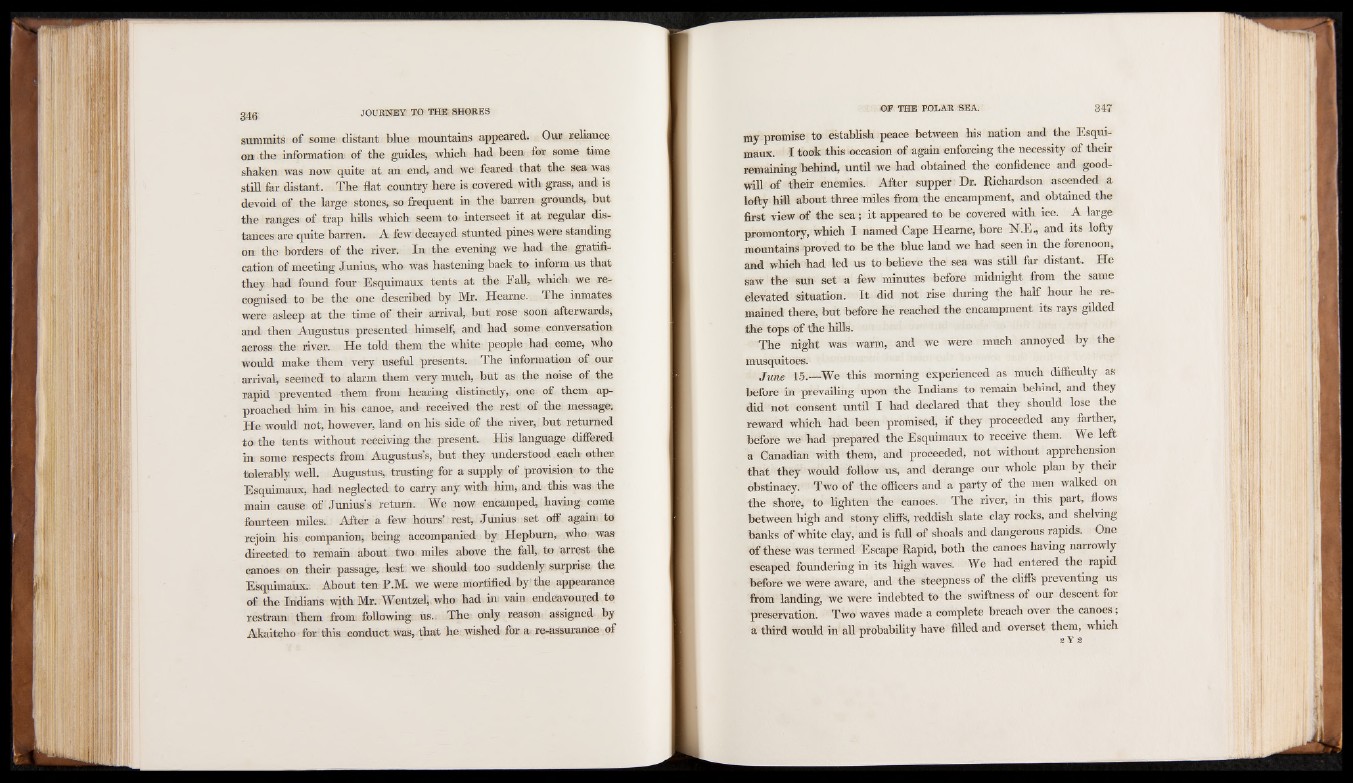
summits of some distant blue mountains appeared. Our reliance
on the information of the guides, which had been, for some time
shaken was now quite at an end, and we feared that the sea was
still far distant. The flat country here is covered with grass, and is
devoid of the large stones, so frequent in the barren grounds, but
the ranges of trap hills which seem to intersect it at regular distances
are quite barren. A few decayed stunted pines? were standing
on the borders of the river. In the evening we had the gratification
of meeting Junius, who was hastening back to inform us that
they had found four Esquimaux tents at the Fall, which we recognised
to be the one described by Mr. J learne. The inmates
were asleep at the time of their arrival, but rose soon afterwards,
and then Augustus presented himself, and had some conversation
across the river. He told them the white people had come, who
would make them very useful presents. The information of our
arrival, seemed to alarm them very much, but as the iloise of the
rapid prevented them from hearing distinctly,; one? of them approached
him in his canoe, and received the rest of the message;
He would not, however, land on his side of the river, but returned
to the tents without receiving the present. His- language differed
in some respects from Augustus’s, but they understood each- other?
tolerably well. Augustus,, trusting for a supply of provision to the
Esquimaux, had neglected to carry any with him, and this was the
main cause of Junius’s return. We now encamped, having come
fourteen miles. After a few hours’ rest, Junius set off again, to
rejoin his companion, being accompanied by Hepburn, who was
directed to remain about two miles above the fall,, to arrest the
canoes on their passage, lest: we should too suddenly surprise the
Esquimaux- About ten P.M. we were mortified by’the appearance
of the Indians with Mr. Wentzel, who had in vain endeavoured to
restrain them from, following us. The only reason assigned by
Akaitcho for this conduct was, that he. wished for a re-assurance of
my promise to establish peace between his nation and the Esquimaux.
I took this occasion of again enforcing the necessity of their
remaining behind, until we had obtained the confidence and goodwill
of their enemies.. After supper : Dr. Richardson ascended a
lofty h it about three miles from the encampment, and obtained the
first view of the sea; it appeared to be covered with ice. A large
promontory, which I named Cape Hearne, bore N .E , and its lofty
mountains proved to be the blue land we had seen in the forenoon,
and which had led us to believe the sea was still far distant. He
saw the sun set a few minutes before midnight from the same
elevated situation. It did not rise during the half hour he remained
there, but before he reached the encampment its rays gilded
the tops of the hills.
The night was warm, and we were much annoyed by the
musquitoes.
June 15.—We this morning experienced as much difficulty as
before in prevailing upon the Indians to remain behind, and they
did not consent until I had declared that they should lose the
reward which had been promised, if they proceeded any farther,
before we had prepared the Esquimaux to receive them. We left
a Canadian with them, and proceeded, not without apprehension
that they would follow us, and derange our whole plan by their
obstinacy. Two of the officers and a party of the men walked on
the shore, to lighten the canoes. The river, in this part, flows
between high and stony cliffs, reddish slate clay rocks, and shelving
banks of white clay, and is full of shoals and dangerous rapids. One
of these was termed Escape Rapid, both the canoes having narrowly
escaped foundering in its high waves. We had entered the rapid
before we were aware, and the steepness of the cliffs preventing us
from landing, we were indebted to the swiftness of our descent for
preservation. Two waves made a complete breach over the canoes,
a third would in all probability have filled and overset them, which